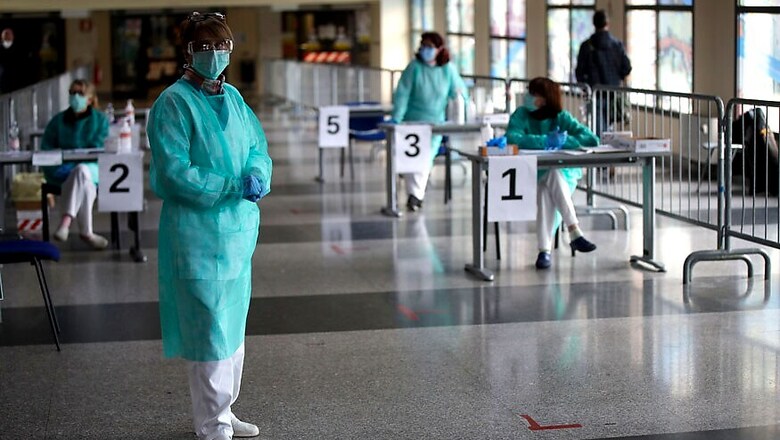
views
Rome: Medical student Chiara Bonini, 26, had barely finished her final exam, before the young doctor was headed for the front line of Italy's coronavirus pandemic. "I want to give a hand to my city that is living in this dramatic moment, and has a real need for doctors," she said of her hometown Bergamo, one of Italy's hardest-hit northern cities.
Bonini is one of thousands of Italian graduates taking up the government's call for urgent help tackling the deadliest outbreak of the virus in the world.
The European country hit the grim milestone over the weekend of 10,000 deaths, accounting for roughly a third of the 30,000-plus deaths worldwide.
With hospitals under extraordinary strain, Italy has expedited the procedure for medical school graduates entering the workforce -- cutting the hospital exam and increasing the number of doctors being recruited.
For many graduates, it will be their first professional job in an industry facing its biggest crisis in a generation. It comes amid the deaths of 50 doctors, according to Italy's national federation of doctors.
The abrupt changes to the procedures for fresh graduates entering the workforce, marks a major shakeup of Italy's education system, said Dr. Alessandro Grimaldi, Director of Infectious Disease at S.S. Salvatore Hospital of L'Aquila.
Currently, students are required to do a residency, where they specialize in a certain area of medicine. But according to Grimaldi, there are between 3,000 and 4,000 fewer residency placements available than the number of students, meaning many travel abroad to work.
Grimaldi likened the money spent on educating Italian medical students who then work overseas, to: "giving a present of a Ferrari to countries abroad every year."
These graduates "would have been such great resources -- especially today," he added.
So as the country enters its sixth week of lockdown, young Italian doctors are being catapulted to the health emergency's forefront.
'I'm scared to pass on this illness'
Bonini was studying for her final medical exams at the University of L'Aquila in central Italy, when the government put the call out for medical students to help out in the north.
She was all set to go to work in her hometown of Bergamo -- until she contracted the virus, she believes from her boyfriend who is also a doctor.
Now fully recovered, Bonini is awaiting clearance to go out and work. Having already contracted coronavirus, Bonini says she feels less afraid about her new job.
"My immune system has already fought this," she said. "So if I were to be infected again, my body would recognize it in some way.
"The only fear I have of getting it again, is if I pass it on," Bonini added. "I'm scared to pass on this illness."
'Arrogant to think this was only a Chinese issue'
Zadeh has been working at a hospital in the hard-hit northern city of Cremona for the last two weeks. He left his comfortable job as a general practitioner in the private sector, after the government sought urgent help from medical professionals.
"A year ago when I graduated, I made a promise to make myself useful in the face of crisis," he said. "Being closed-off in the comfort of an office is not helping this national emergency."
Zadeh's family is originally from Iran, where his 80-year-old grandmother is weathering the outbreak there alone.
He says Iran's response to the emergency has been weaker than Italy's, but countries in the West should also have been better prepared. "We have all been very arrogant to think this was only a Chinese issue," said Zadeh.
"We in the West didn't think this was our issue," he said, adding, "Instead we are about to be at full capacity in our field hospitals."
Zadeh said that although Italy has one of the best health care systems in the world, he hopes it will also learn some lessons from the crisis.
"Sometimes when things go back to normal, memory is short," he said. "As a young Italian, I hope there is more investment in the health care system for students."
'I invested my entire life to do this work'
Pini graduated from the University of Parma, also in northern Italy, last year. But she was forced to move to neighboring Switzerland for work, after failing to secure a residency in Italy.
Like many recent graduates, she jumped at the chance to help her country as it grapples with the pandemic.
The 40-year-old said she started her degree later in life and "took my time to do it well." Medicine was her life's calling, added Pini. "I invested my entire life to do this work," she said. "I didn't get married, I lived to study."
Pini is now working at a hospital in her hometown and in Cremona.
The position is temporary but she hopes in the future it might lead to full-time employment in her own country. "I'm Italian and I would love to work in Italy," she said.
















Comments
0 comment